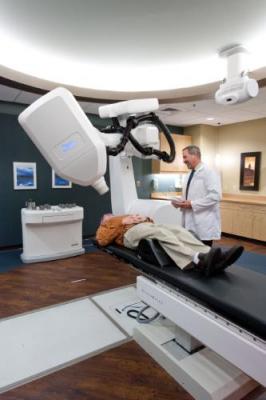
December 28, 2012 — Accuray Inc. announced clinical findings using noninvasive CyberKnife stereotactic body radiation therapy (SBRT) for the treatment of prostate cancer. Two studies were presented at the 54th annual meeting of the American Society for Radiation Oncology (ASTRO) in Boston at a prostate-focused press conference, for which the use of CyberKnife SBRT for prostate cancer represented half of the press conference’s focus.
During ASTRO’s scientific sessions, data on CyberKnife prostate SBRT for organ-confined prostate cancer was presented in the form of three podium presentations and seven poster presentations by researchers from leading U.S. academic and community-based cancer treatment centers. In these studies, all patients were treated in five or fewer non-surgical outpatient treatment sessions – far fewer than the 40 or more that patients typically receive with traditional radiotherapy or intensity-modulated radiation therapy (IMRT). Overall, efficacy and toxicity findings compared favorably with longer courses of IMRT, expanding the foundation of evidence supporting the value of CyberKnife prostate SBRT for patients with organ confined prostate cancer.
The following is an overview of the three CyberKnife prostate studies selected for podium presentation by ASTRO’s Review Committee:
Alan J. Katz, M.D., a radiation oncologist with Flushing Radiation Oncology in Flushing, N.Y., presented findings from a multicenter study, organized by researchers at UCLA Medical Center, of outcomes for 1,100 low, intermediate and high-risk prostate cancer treated with CyberKnife SBRT at eight centers within the United States and Italy.
Patients were followed for a median of 36 months, and close to half were followed for at least four years. Actuarial five-year disease-free survival was 95 percent for low-risk patients, 90 percent for intermediate-risk patients and 80 percent for high-risk patients. These findings compare favorably with other surgical and radiation-based treatments.
"These findings are in line with those of the more than 800 patients I’ve treated personally to date, some of whom are up to seven years post-treatment,” said Katz. “I am excited to see the body of long-term data supporting the outcomes of CyberKnife prostate SBRT growing in support of this treatment’s benefits for patients.”
CyberKnife SBRT for patients with intermediate-risk prostate cancer was the focus of a study presented by Robert Meier, M.D., a radiation oncologist with the Swedish Cancer Institute in Seattle, and co-lead by Beth Israel Deaconess Medical Center in Boston. In the multicenter study, 129 patients were treated at 21 centers throughout the United States. At a median follow-up of 36 months, the three-year disease-free survival rate was 99.2 percent, which is higher than those typically seen with external beam radiotherapy. The urinary and rectal side effect profile was as good as or better than other radiotherapy treatments, with comparable sexual function outcomes.
"Our study demonstrates very promising cancer control rates and few side effects, which are in line with the growing body of clinical evidence supporting the value of CyberKnife prostate SBRT,” said Meier. “Through the use of image guidance and robotics, we’re able to continuously track the prostate and concentrate hundreds of radiation beams into the target with sub-millimeter accuracy, which helps us effectively treat the disease while sparing nearby healthy tissue and critical structures.”
Donald Fuller, M.D., a radiation oncologist from Genesis Healthcare in San Diego, presented findings from a multicenter study of 260 patients with low and intermediate-risk prostate cancer treated using CyberKnife SBRT at 17 institutions, using an approach that emulates the dosimetry of high dose rate (HDR) brachytherapy.
Patients were followed for up to 48 months with a median follow-up of 24 months, and found to have disease-free survival of 98.5 percent. Urinary and rectal toxicities reported at a minimum one-year follow-up were in line with outcomes of traditional radiation therapy, and erectile function returned to baseline by three years, with minimal disruption after treatment.
"These findings should encourage men to explore CyberKnife SBRT as a viable alternative to surgery or other radiation treatments, such as brachytherapy and intensity-modulated radiation therapy,” said Fuller. “Findings to date indicate we may be able to minimize the undesirable side effects typically associated with other treatment modalities and help to preserve patients' quality of life during and after prostate cancer treatment.”
Additionally, seven posters highlighting CyberKnife prostate SBRT experience were presented by researchers from the University of California San Francisco, Georgetown University Hospital and Winthrop University Hospital, as well as additional research from Flushing Radiation Oncology and Swedish Cancer Institute in Seattle, further supporting the maturing body of prostate SBRT evidence.
For more information: www.accuray.com


 January 30, 2026
January 30, 2026 









